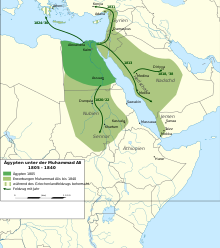Orient crisis
In the Orient Crisis , sometimes also called the Second Orient Crisis or the Oriental Crisis , European powers interfered in the conflict between the Ottoman Empire and Egypt, which formally belonged to the Ottoman Empire , in 1839/41 .
prehistory
The Greek War of Independence and the Russo-Turkish War (1828–1829) had weakened the Ottoman Empire . The Oriental question about the preservation of the Ottoman Empire, later known as the “ Sick Man on the Bosporus ”, became a constant topic of European diplomacy. After the Ottoman sultan Mahmud II refused to appoint Muhammad Ali Pasha , the viceroy of Egypt, which was part of the Ottoman Empire, as governor in Syria, Egyptian troops occupied Palestine and Syria in 1831 and advanced as far as Anatolia in 1832 . The Russian tsar sent troops to support the Ottoman sultan, which in turn worried Great Britain . In 1833, in the Peace of Kütajeh, Muhammad Ali's rule over Syria was recognized for the time being. These events are sometimes called the First Crisis in the Orient .
France had used the Turkish defeat in the Greek War of Independence to occupy Algeria in 1830 . From 1840 onwards, Prime Minister Adolphe Thiers tried to compensate for a lack of domestic political success by engaging in foreign policy. France saw in Muhammad Ali Pasha an ideal ally and supported him in his attempt to finally break free from the suzerainty of the Turkish sultan. The aim of French policy was to turn Africa , which borders the Mediterranean , beyond Suez into a French sphere of influence.
course
In 1838 Turkish troops tried to drive Muhammad Ali from Syria, but were defeated in 1839 by his son Ibrahim Pasha . This weakening of Turkey called the great powers Great Britain , Russia , Prussia and Austria on the scene - they wanted to preserve the Ottoman Empire , since a collapse of Turkish rule would have entailed incalculable risks. France under Thiers, on the other hand, supported Cairo. This renewed the old coalition between the Holy Alliance and Great Britain against France. Thiers aggravated this confrontation through general mobilization and reinforcement of French fortresses. A French naval formation under Admiral Julien Pierre Anne Lalande threatened to come to the aid of the Egyptians.
Great Britain and the Holy Alliance signed the Four Power Treaty in London on July 15, 1840 to pacify the Levant and gave Mohammed Ali Pasha an ultimatum to withdraw. After the Egyptian ruler ignored this ultimatum, Allied troops landed in Syria and captured Beirut and other coastal cities. France had to give up support to Egypt, while the Ottoman Empire received British military aid. In 1841, Mohammed Ali Pasha was forced to evacuate Syria and Palestine and to restrict his rule to Egypt, which however remained under Ottoman suzerainty. However, he was granted the right to pass the rule on to his descendants.
The Dardanelles Treaty of 1841 is seen as the conclusion of the Oriental Crisis .
consequences
With the revival of the victorious coalition of 1814 , the foreign policy crisis in France turned into a national mood crisis. The effect on the French public was enormous: one felt ignored and humiliated, there was talk of a "diplomatic Waterloo ". To prevent the outraged people from sweeping away the new French monarchy, the Thiers cabinet directed the growing national indignation of the French to another topic. Parts of the French public demanded the revision of the treaties of 1815 , war against Great Britain and especially against the German states. The crisis in the East was followed by the Rhine crisis .
After his policy failed, Thiers was dismissed in October 1840.
literature
- Hartwig Brandt : Europe 1815-1850: Reaction - Constitution - Revolution . Kohlhammer, Stuttgart 2002, ISBN 3-17-014804-4 , p. 133 f .
